Analyzing Coca Cola HBC's Corporate Reporting Under IFRS Standards
VerifiedAdded on 2023/06/15
|11
|2476
|485
Report
AI Summary
This report provides an analysis of Coca Cola HBC's financial reporting practices in accordance with International Financial Reporting Standards (IFRS). It outlines the key objectives of financial reporting using IFRS, discusses the conceptual framework and its implications for users of financial statements, and examines the qualitative characteristics of financial reporting. The report also relates the chairman’s report to details contained in the financial statements, assesses the impact of IFRS on Coca Cola HBC's financial reports, and explores the company's disclosure of non-financial information to enhance its financial reports. Furthermore, the analysis identifies material financial risks and opportunities present for Coca Cola HBC, emphasizing the company's focus on risk management and value creation through transparent reporting and adherence to IFRS standards. The company declares dividends annually so that at least 35% of unconsolidated remain adjusted after tax IFRS profits and the material issues of the company are reviewed yearly that facilitates Coca Cola HBC to make sure that it always reflects new insights from the stakeholders and business.
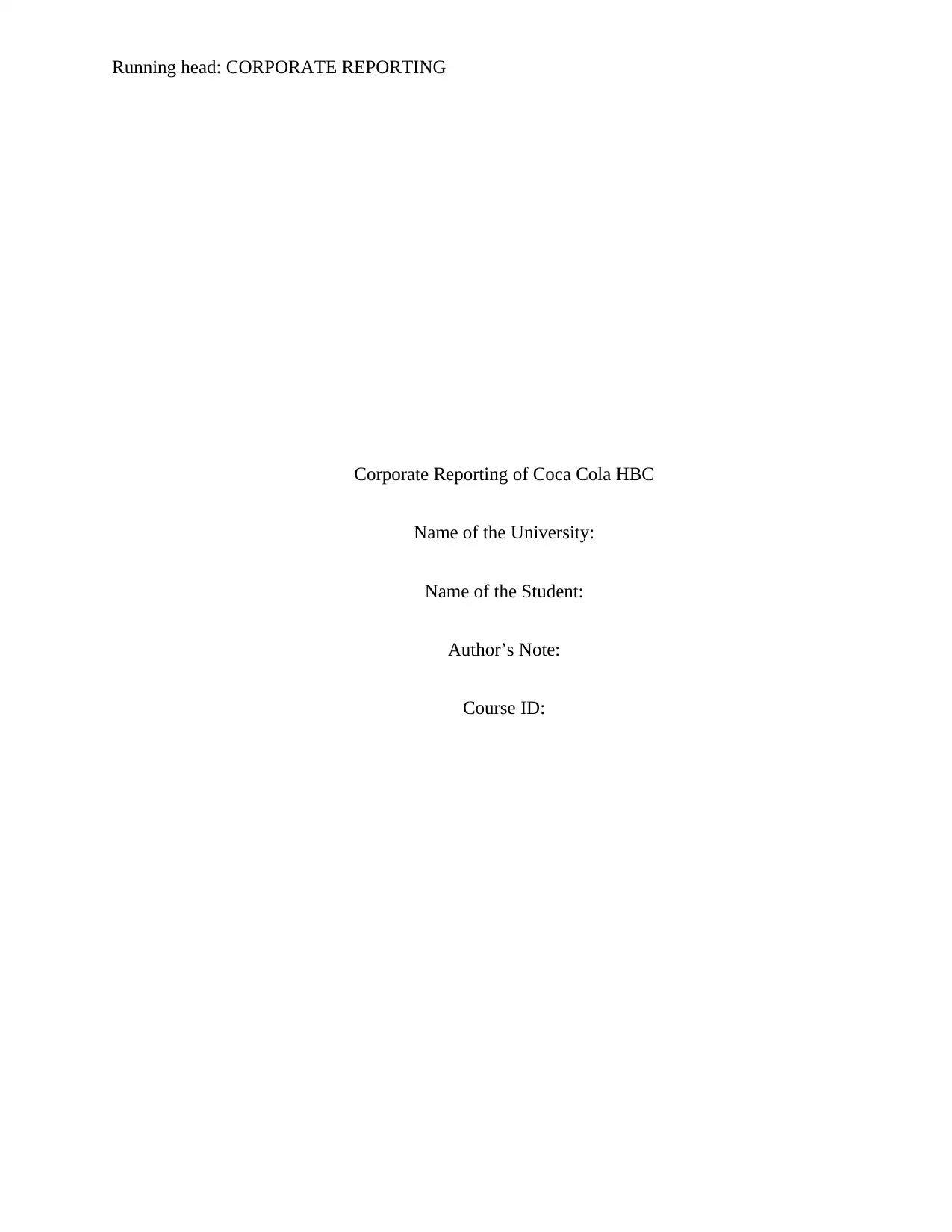
Running head: CORPORATE REPORTING
Corporate Reporting of Coca Cola HBC
Name of the University:
Name of the Student:
Author’s Note:
Course ID:
Corporate Reporting of Coca Cola HBC
Name of the University:
Name of the Student:
Author’s Note:
Course ID:
Paraphrase This Document
Need a fresh take? Get an instant paraphrase of this document with our AI Paraphraser
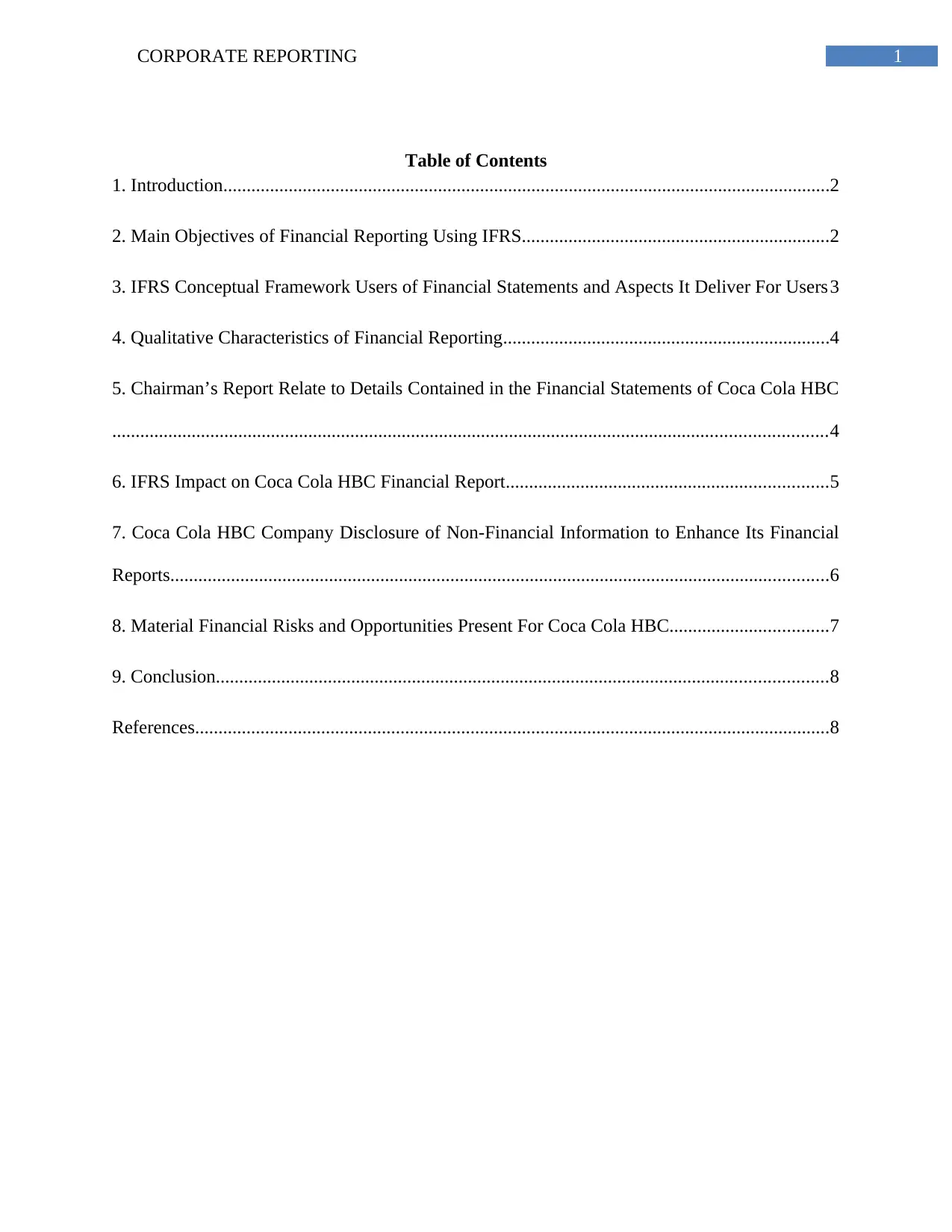
1CORPORATE REPORTING
Table of Contents
1. Introduction..................................................................................................................................2
2. Main Objectives of Financial Reporting Using IFRS..................................................................2
3. IFRS Conceptual Framework Users of Financial Statements and Aspects It Deliver For Users 3
4. Qualitative Characteristics of Financial Reporting......................................................................4
5. Chairman’s Report Relate to Details Contained in the Financial Statements of Coca Cola HBC
.........................................................................................................................................................4
6. IFRS Impact on Coca Cola HBC Financial Report.....................................................................5
7. Coca Cola HBC Company Disclosure of Non-Financial Information to Enhance Its Financial
Reports.............................................................................................................................................6
8. Material Financial Risks and Opportunities Present For Coca Cola HBC..................................7
9. Conclusion...................................................................................................................................8
References........................................................................................................................................8
Table of Contents
1. Introduction..................................................................................................................................2
2. Main Objectives of Financial Reporting Using IFRS..................................................................2
3. IFRS Conceptual Framework Users of Financial Statements and Aspects It Deliver For Users 3
4. Qualitative Characteristics of Financial Reporting......................................................................4
5. Chairman’s Report Relate to Details Contained in the Financial Statements of Coca Cola HBC
.........................................................................................................................................................4
6. IFRS Impact on Coca Cola HBC Financial Report.....................................................................5
7. Coca Cola HBC Company Disclosure of Non-Financial Information to Enhance Its Financial
Reports.............................................................................................................................................6
8. Material Financial Risks and Opportunities Present For Coca Cola HBC..................................7
9. Conclusion...................................................................................................................................8
References........................................................................................................................................8
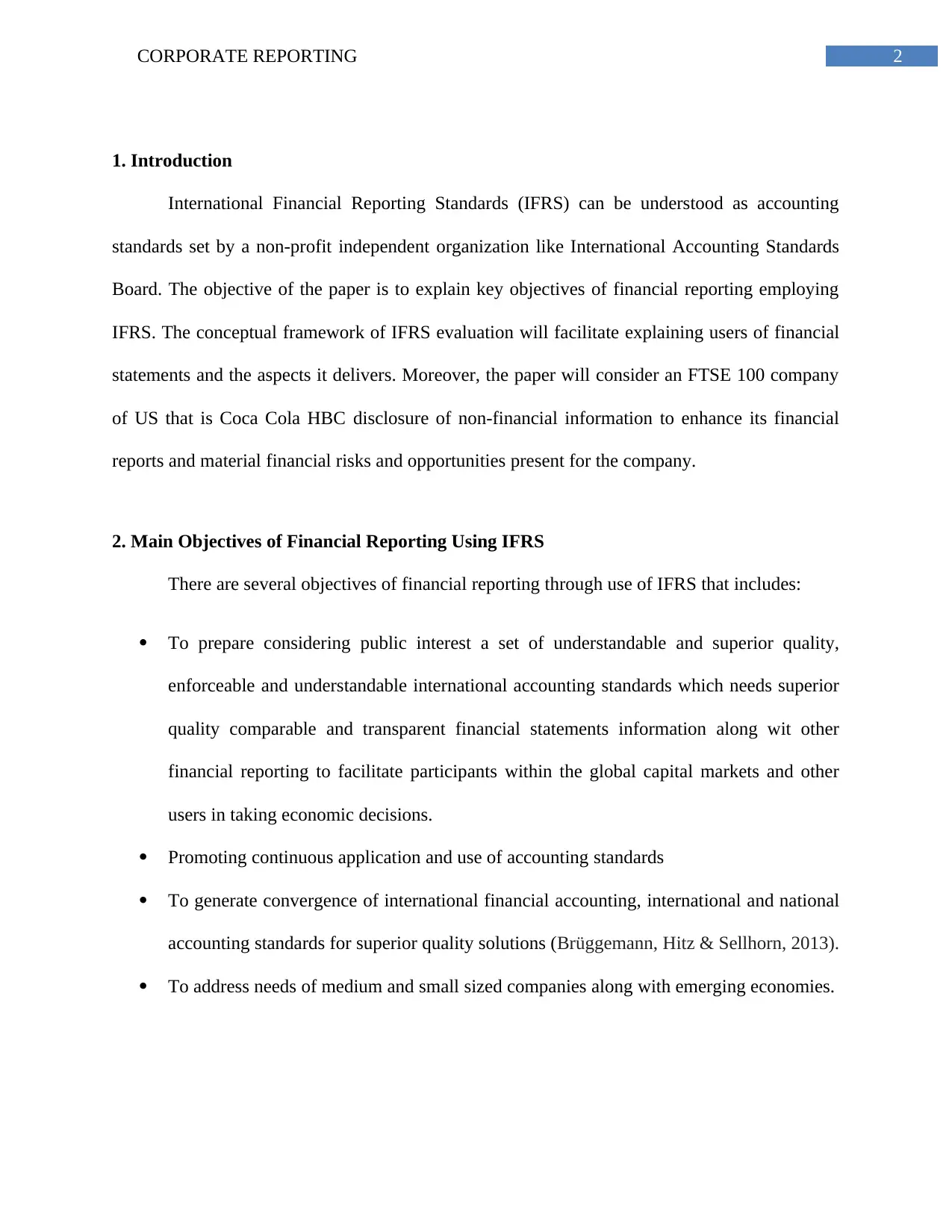
2CORPORATE REPORTING
1. Introduction
International Financial Reporting Standards (IFRS) can be understood as accounting
standards set by a non-profit independent organization like International Accounting Standards
Board. The objective of the paper is to explain key objectives of financial reporting employing
IFRS. The conceptual framework of IFRS evaluation will facilitate explaining users of financial
statements and the aspects it delivers. Moreover, the paper will consider an FTSE 100 company
of US that is Coca Cola HBC disclosure of non-financial information to enhance its financial
reports and material financial risks and opportunities present for the company.
2. Main Objectives of Financial Reporting Using IFRS
There are several objectives of financial reporting through use of IFRS that includes:
To prepare considering public interest a set of understandable and superior quality,
enforceable and understandable international accounting standards which needs superior
quality comparable and transparent financial statements information along wit other
financial reporting to facilitate participants within the global capital markets and other
users in taking economic decisions.
Promoting continuous application and use of accounting standards
To generate convergence of international financial accounting, international and national
accounting standards for superior quality solutions (Brüggemann, Hitz & Sellhorn, 2013).
To address needs of medium and small sized companies along with emerging economies.
1. Introduction
International Financial Reporting Standards (IFRS) can be understood as accounting
standards set by a non-profit independent organization like International Accounting Standards
Board. The objective of the paper is to explain key objectives of financial reporting employing
IFRS. The conceptual framework of IFRS evaluation will facilitate explaining users of financial
statements and the aspects it delivers. Moreover, the paper will consider an FTSE 100 company
of US that is Coca Cola HBC disclosure of non-financial information to enhance its financial
reports and material financial risks and opportunities present for the company.
2. Main Objectives of Financial Reporting Using IFRS
There are several objectives of financial reporting through use of IFRS that includes:
To prepare considering public interest a set of understandable and superior quality,
enforceable and understandable international accounting standards which needs superior
quality comparable and transparent financial statements information along wit other
financial reporting to facilitate participants within the global capital markets and other
users in taking economic decisions.
Promoting continuous application and use of accounting standards
To generate convergence of international financial accounting, international and national
accounting standards for superior quality solutions (Brüggemann, Hitz & Sellhorn, 2013).
To address needs of medium and small sized companies along with emerging economies.
⊘ This is a preview!⊘
Do you want full access?
Subscribe today to unlock all pages.

Trusted by 1+ million students worldwide
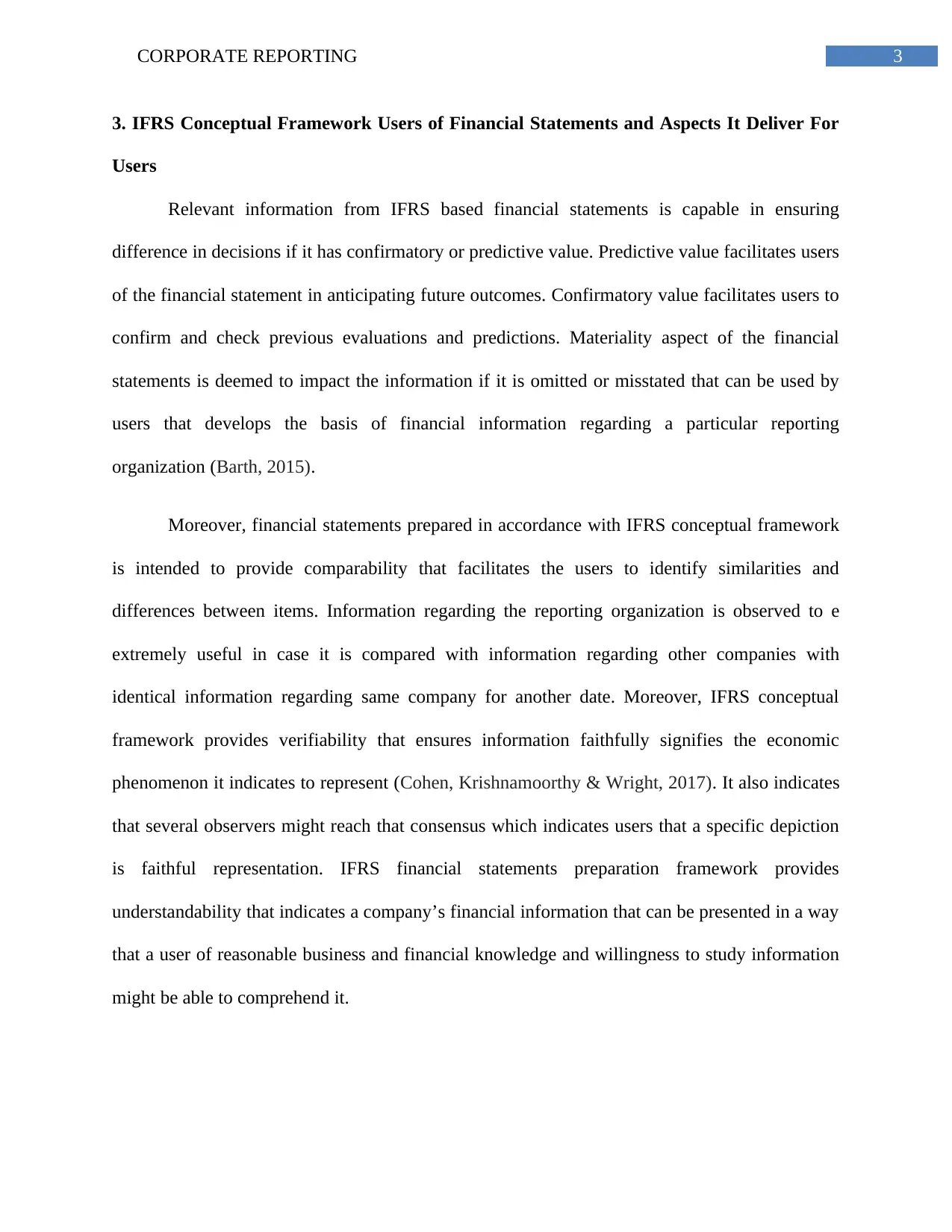
3CORPORATE REPORTING
3. IFRS Conceptual Framework Users of Financial Statements and Aspects It Deliver For
Users
Relevant information from IFRS based financial statements is capable in ensuring
difference in decisions if it has confirmatory or predictive value. Predictive value facilitates users
of the financial statement in anticipating future outcomes. Confirmatory value facilitates users to
confirm and check previous evaluations and predictions. Materiality aspect of the financial
statements is deemed to impact the information if it is omitted or misstated that can be used by
users that develops the basis of financial information regarding a particular reporting
organization (Barth, 2015).
Moreover, financial statements prepared in accordance with IFRS conceptual framework
is intended to provide comparability that facilitates the users to identify similarities and
differences between items. Information regarding the reporting organization is observed to e
extremely useful in case it is compared with information regarding other companies with
identical information regarding same company for another date. Moreover, IFRS conceptual
framework provides verifiability that ensures information faithfully signifies the economic
phenomenon it indicates to represent (Cohen, Krishnamoorthy & Wright, 2017). It also indicates
that several observers might reach that consensus which indicates users that a specific depiction
is faithful representation. IFRS financial statements preparation framework provides
understandability that indicates a company’s financial information that can be presented in a way
that a user of reasonable business and financial knowledge and willingness to study information
might be able to comprehend it.
3. IFRS Conceptual Framework Users of Financial Statements and Aspects It Deliver For
Users
Relevant information from IFRS based financial statements is capable in ensuring
difference in decisions if it has confirmatory or predictive value. Predictive value facilitates users
of the financial statement in anticipating future outcomes. Confirmatory value facilitates users to
confirm and check previous evaluations and predictions. Materiality aspect of the financial
statements is deemed to impact the information if it is omitted or misstated that can be used by
users that develops the basis of financial information regarding a particular reporting
organization (Barth, 2015).
Moreover, financial statements prepared in accordance with IFRS conceptual framework
is intended to provide comparability that facilitates the users to identify similarities and
differences between items. Information regarding the reporting organization is observed to e
extremely useful in case it is compared with information regarding other companies with
identical information regarding same company for another date. Moreover, IFRS conceptual
framework provides verifiability that ensures information faithfully signifies the economic
phenomenon it indicates to represent (Cohen, Krishnamoorthy & Wright, 2017). It also indicates
that several observers might reach that consensus which indicates users that a specific depiction
is faithful representation. IFRS financial statements preparation framework provides
understandability that indicates a company’s financial information that can be presented in a way
that a user of reasonable business and financial knowledge and willingness to study information
might be able to comprehend it.
Paraphrase This Document
Need a fresh take? Get an instant paraphrase of this document with our AI Paraphraser
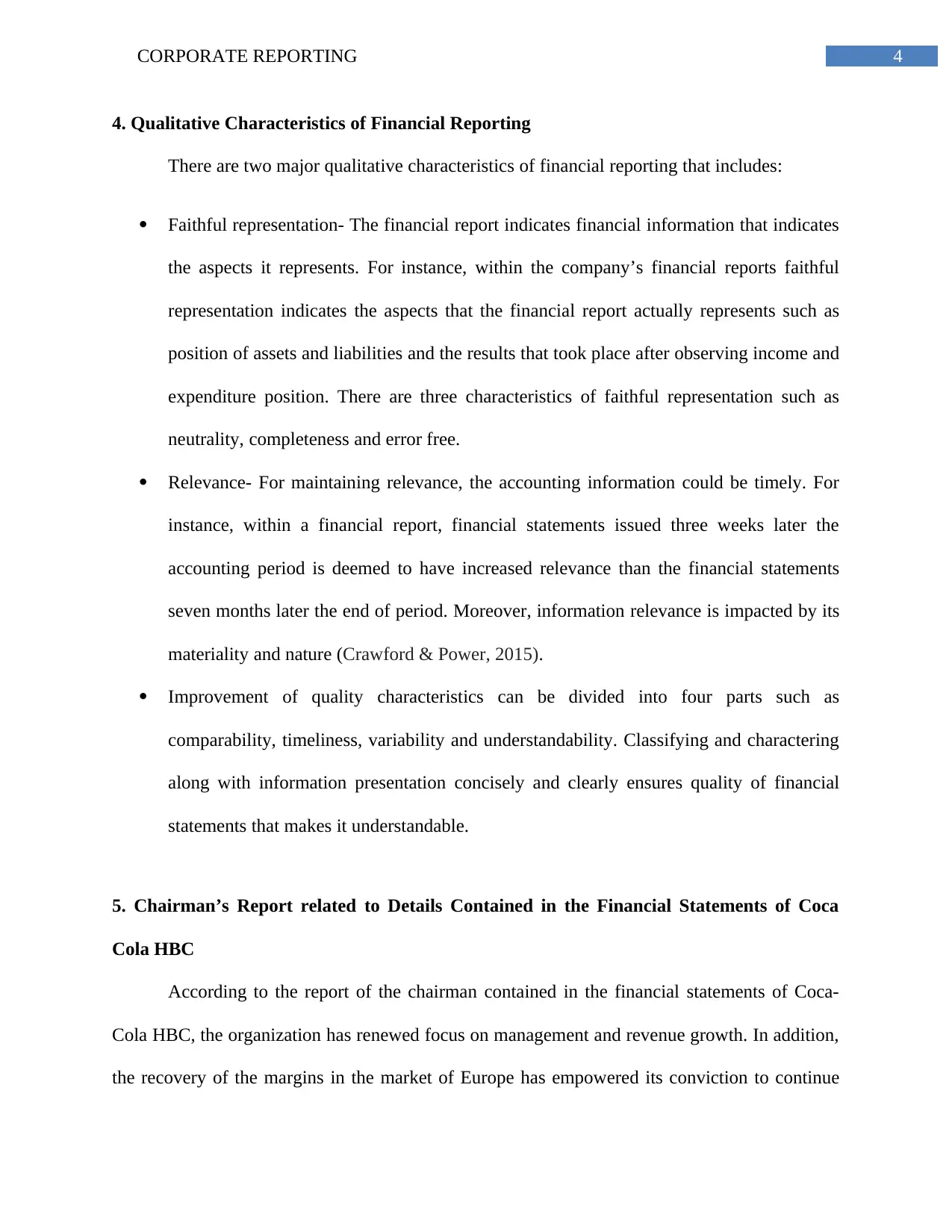
4CORPORATE REPORTING
4. Qualitative Characteristics of Financial Reporting
There are two major qualitative characteristics of financial reporting that includes:
Faithful representation- The financial report indicates financial information that indicates
the aspects it represents. For instance, within the company’s financial reports faithful
representation indicates the aspects that the financial report actually represents such as
position of assets and liabilities and the results that took place after observing income and
expenditure position. There are three characteristics of faithful representation such as
neutrality, completeness and error free.
Relevance- For maintaining relevance, the accounting information could be timely. For
instance, within a financial report, financial statements issued three weeks later the
accounting period is deemed to have increased relevance than the financial statements
seven months later the end of period. Moreover, information relevance is impacted by its
materiality and nature (Crawford & Power, 2015).
Improvement of quality characteristics can be divided into four parts such as
comparability, timeliness, variability and understandability. Classifying and charactering
along with information presentation concisely and clearly ensures quality of financial
statements that makes it understandable.
5. Chairman’s Report related to Details Contained in the Financial Statements of Coca
Cola HBC
According to the report of the chairman contained in the financial statements of Coca-
Cola HBC, the organization has renewed focus on management and revenue growth. In addition,
the recovery of the margins in the market of Europe has empowered its conviction to continue
4. Qualitative Characteristics of Financial Reporting
There are two major qualitative characteristics of financial reporting that includes:
Faithful representation- The financial report indicates financial information that indicates
the aspects it represents. For instance, within the company’s financial reports faithful
representation indicates the aspects that the financial report actually represents such as
position of assets and liabilities and the results that took place after observing income and
expenditure position. There are three characteristics of faithful representation such as
neutrality, completeness and error free.
Relevance- For maintaining relevance, the accounting information could be timely. For
instance, within a financial report, financial statements issued three weeks later the
accounting period is deemed to have increased relevance than the financial statements
seven months later the end of period. Moreover, information relevance is impacted by its
materiality and nature (Crawford & Power, 2015).
Improvement of quality characteristics can be divided into four parts such as
comparability, timeliness, variability and understandability. Classifying and charactering
along with information presentation concisely and clearly ensures quality of financial
statements that makes it understandable.
5. Chairman’s Report related to Details Contained in the Financial Statements of Coca
Cola HBC
According to the report of the chairman contained in the financial statements of Coca-
Cola HBC, the organization has renewed focus on management and revenue growth. In addition,
the recovery of the margins in the market of Europe has empowered its conviction to continue
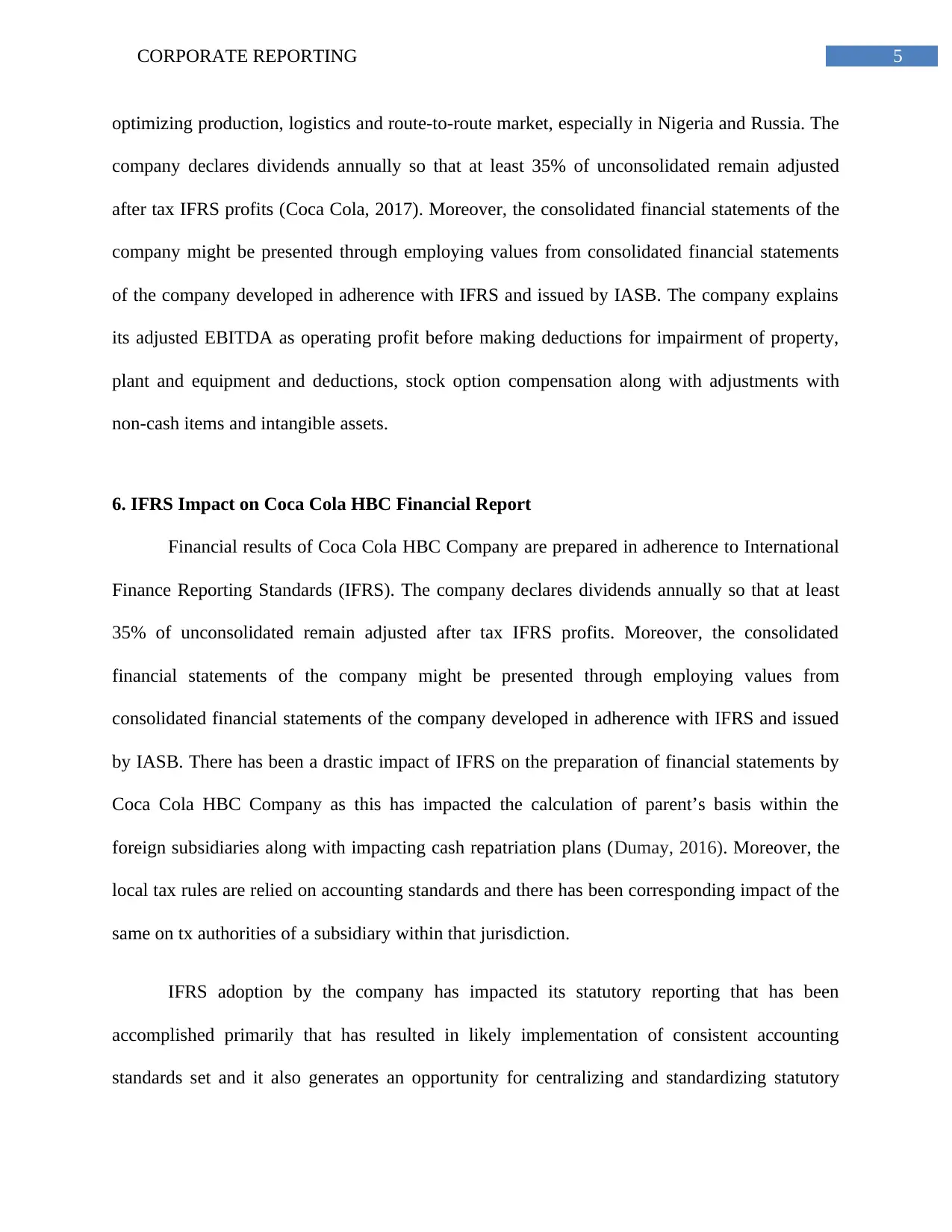
5CORPORATE REPORTING
optimizing production, logistics and route-to-route market, especially in Nigeria and Russia. The
company declares dividends annually so that at least 35% of unconsolidated remain adjusted
after tax IFRS profits (Coca Cola, 2017). Moreover, the consolidated financial statements of the
company might be presented through employing values from consolidated financial statements
of the company developed in adherence with IFRS and issued by IASB. The company explains
its adjusted EBITDA as operating profit before making deductions for impairment of property,
plant and equipment and deductions, stock option compensation along with adjustments with
non-cash items and intangible assets.
6. IFRS Impact on Coca Cola HBC Financial Report
Financial results of Coca Cola HBC Company are prepared in adherence to International
Finance Reporting Standards (IFRS). The company declares dividends annually so that at least
35% of unconsolidated remain adjusted after tax IFRS profits. Moreover, the consolidated
financial statements of the company might be presented through employing values from
consolidated financial statements of the company developed in adherence with IFRS and issued
by IASB. There has been a drastic impact of IFRS on the preparation of financial statements by
Coca Cola HBC Company as this has impacted the calculation of parent’s basis within the
foreign subsidiaries along with impacting cash repatriation plans (Dumay, 2016). Moreover, the
local tax rules are relied on accounting standards and there has been corresponding impact of the
same on tx authorities of a subsidiary within that jurisdiction.
IFRS adoption by the company has impacted its statutory reporting that has been
accomplished primarily that has resulted in likely implementation of consistent accounting
standards set and it also generates an opportunity for centralizing and standardizing statutory
optimizing production, logistics and route-to-route market, especially in Nigeria and Russia. The
company declares dividends annually so that at least 35% of unconsolidated remain adjusted
after tax IFRS profits (Coca Cola, 2017). Moreover, the consolidated financial statements of the
company might be presented through employing values from consolidated financial statements
of the company developed in adherence with IFRS and issued by IASB. The company explains
its adjusted EBITDA as operating profit before making deductions for impairment of property,
plant and equipment and deductions, stock option compensation along with adjustments with
non-cash items and intangible assets.
6. IFRS Impact on Coca Cola HBC Financial Report
Financial results of Coca Cola HBC Company are prepared in adherence to International
Finance Reporting Standards (IFRS). The company declares dividends annually so that at least
35% of unconsolidated remain adjusted after tax IFRS profits. Moreover, the consolidated
financial statements of the company might be presented through employing values from
consolidated financial statements of the company developed in adherence with IFRS and issued
by IASB. There has been a drastic impact of IFRS on the preparation of financial statements by
Coca Cola HBC Company as this has impacted the calculation of parent’s basis within the
foreign subsidiaries along with impacting cash repatriation plans (Dumay, 2016). Moreover, the
local tax rules are relied on accounting standards and there has been corresponding impact of the
same on tx authorities of a subsidiary within that jurisdiction.
IFRS adoption by the company has impacted its statutory reporting that has been
accomplished primarily that has resulted in likely implementation of consistent accounting
standards set and it also generates an opportunity for centralizing and standardizing statutory
⊘ This is a preview!⊘
Do you want full access?
Subscribe today to unlock all pages.

Trusted by 1+ million students worldwide
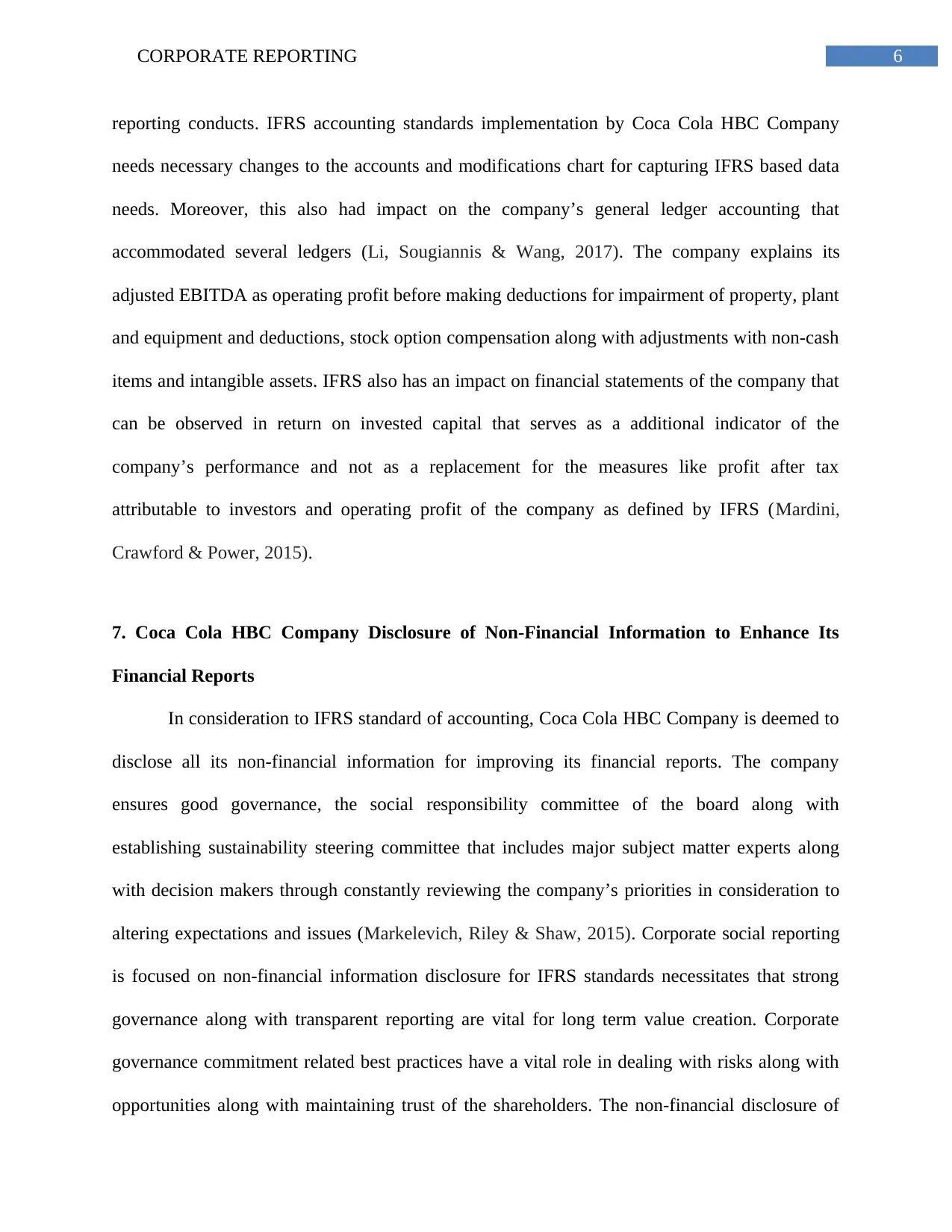
6CORPORATE REPORTING
reporting conducts. IFRS accounting standards implementation by Coca Cola HBC Company
needs necessary changes to the accounts and modifications chart for capturing IFRS based data
needs. Moreover, this also had impact on the company’s general ledger accounting that
accommodated several ledgers (Li, Sougiannis & Wang, 2017). The company explains its
adjusted EBITDA as operating profit before making deductions for impairment of property, plant
and equipment and deductions, stock option compensation along with adjustments with non-cash
items and intangible assets. IFRS also has an impact on financial statements of the company that
can be observed in return on invested capital that serves as a additional indicator of the
company’s performance and not as a replacement for the measures like profit after tax
attributable to investors and operating profit of the company as defined by IFRS (Mardini,
Crawford & Power, 2015).
7. Coca Cola HBC Company Disclosure of Non-Financial Information to Enhance Its
Financial Reports
In consideration to IFRS standard of accounting, Coca Cola HBC Company is deemed to
disclose all its non-financial information for improving its financial reports. The company
ensures good governance, the social responsibility committee of the board along with
establishing sustainability steering committee that includes major subject matter experts along
with decision makers through constantly reviewing the company’s priorities in consideration to
altering expectations and issues (Markelevich, Riley & Shaw, 2015). Corporate social reporting
is focused on non-financial information disclosure for IFRS standards necessitates that strong
governance along with transparent reporting are vital for long term value creation. Corporate
governance commitment related best practices have a vital role in dealing with risks along with
opportunities along with maintaining trust of the shareholders. The non-financial disclosure of
reporting conducts. IFRS accounting standards implementation by Coca Cola HBC Company
needs necessary changes to the accounts and modifications chart for capturing IFRS based data
needs. Moreover, this also had impact on the company’s general ledger accounting that
accommodated several ledgers (Li, Sougiannis & Wang, 2017). The company explains its
adjusted EBITDA as operating profit before making deductions for impairment of property, plant
and equipment and deductions, stock option compensation along with adjustments with non-cash
items and intangible assets. IFRS also has an impact on financial statements of the company that
can be observed in return on invested capital that serves as a additional indicator of the
company’s performance and not as a replacement for the measures like profit after tax
attributable to investors and operating profit of the company as defined by IFRS (Mardini,
Crawford & Power, 2015).
7. Coca Cola HBC Company Disclosure of Non-Financial Information to Enhance Its
Financial Reports
In consideration to IFRS standard of accounting, Coca Cola HBC Company is deemed to
disclose all its non-financial information for improving its financial reports. The company
ensures good governance, the social responsibility committee of the board along with
establishing sustainability steering committee that includes major subject matter experts along
with decision makers through constantly reviewing the company’s priorities in consideration to
altering expectations and issues (Markelevich, Riley & Shaw, 2015). Corporate social reporting
is focused on non-financial information disclosure for IFRS standards necessitates that strong
governance along with transparent reporting are vital for long term value creation. Corporate
governance commitment related best practices have a vital role in dealing with risks along with
opportunities along with maintaining trust of the shareholders. The non-financial disclosure of
Paraphrase This Document
Need a fresh take? Get an instant paraphrase of this document with our AI Paraphraser
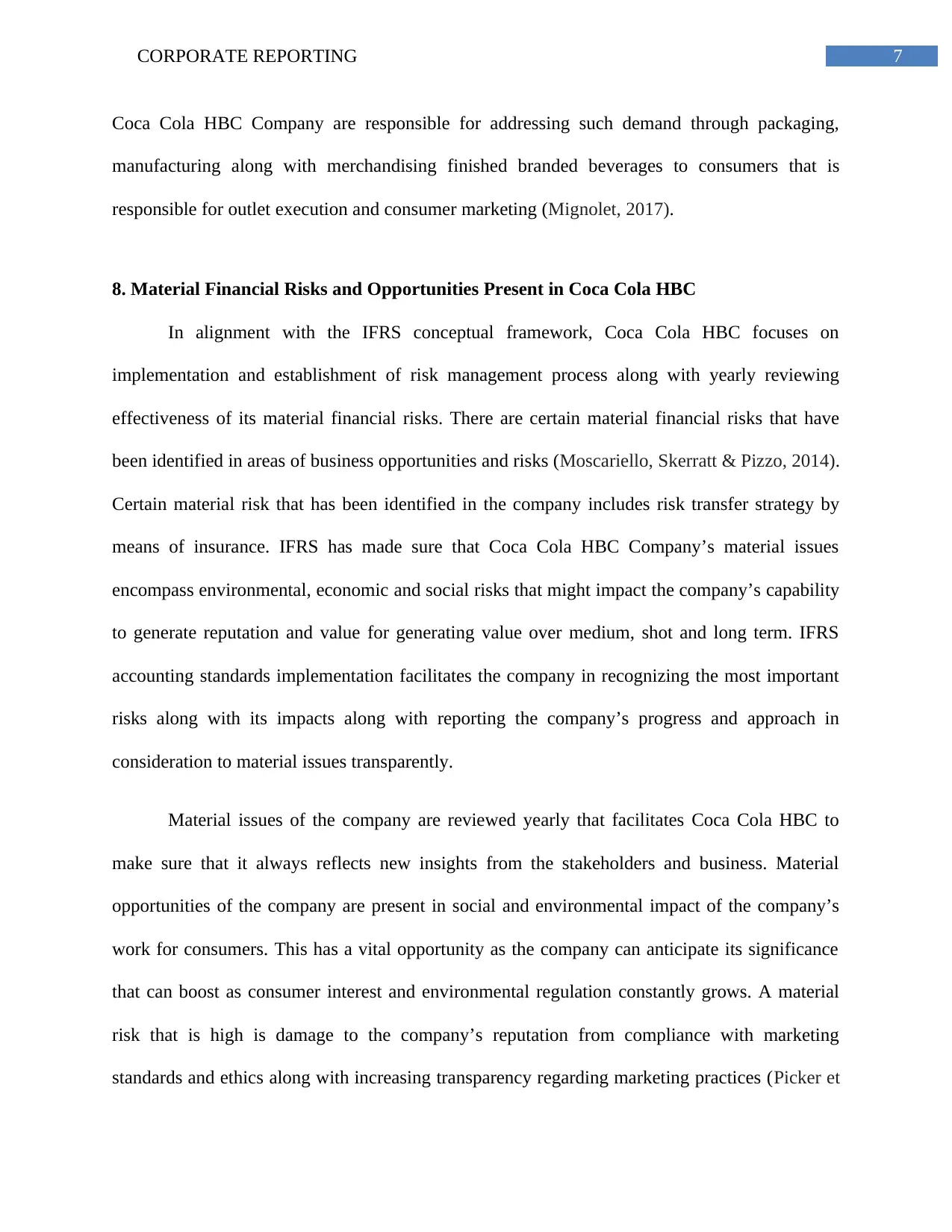
7CORPORATE REPORTING
Coca Cola HBC Company are responsible for addressing such demand through packaging,
manufacturing along with merchandising finished branded beverages to consumers that is
responsible for outlet execution and consumer marketing (Mignolet, 2017).
8. Material Financial Risks and Opportunities Present in Coca Cola HBC
In alignment with the IFRS conceptual framework, Coca Cola HBC focuses on
implementation and establishment of risk management process along with yearly reviewing
effectiveness of its material financial risks. There are certain material financial risks that have
been identified in areas of business opportunities and risks (Moscariello, Skerratt & Pizzo, 2014).
Certain material risk that has been identified in the company includes risk transfer strategy by
means of insurance. IFRS has made sure that Coca Cola HBC Company’s material issues
encompass environmental, economic and social risks that might impact the company’s capability
to generate reputation and value for generating value over medium, shot and long term. IFRS
accounting standards implementation facilitates the company in recognizing the most important
risks along with its impacts along with reporting the company’s progress and approach in
consideration to material issues transparently.
Material issues of the company are reviewed yearly that facilitates Coca Cola HBC to
make sure that it always reflects new insights from the stakeholders and business. Material
opportunities of the company are present in social and environmental impact of the company’s
work for consumers. This has a vital opportunity as the company can anticipate its significance
that can boost as consumer interest and environmental regulation constantly grows. A material
risk that is high is damage to the company’s reputation from compliance with marketing
standards and ethics along with increasing transparency regarding marketing practices (Picker et
Coca Cola HBC Company are responsible for addressing such demand through packaging,
manufacturing along with merchandising finished branded beverages to consumers that is
responsible for outlet execution and consumer marketing (Mignolet, 2017).
8. Material Financial Risks and Opportunities Present in Coca Cola HBC
In alignment with the IFRS conceptual framework, Coca Cola HBC focuses on
implementation and establishment of risk management process along with yearly reviewing
effectiveness of its material financial risks. There are certain material financial risks that have
been identified in areas of business opportunities and risks (Moscariello, Skerratt & Pizzo, 2014).
Certain material risk that has been identified in the company includes risk transfer strategy by
means of insurance. IFRS has made sure that Coca Cola HBC Company’s material issues
encompass environmental, economic and social risks that might impact the company’s capability
to generate reputation and value for generating value over medium, shot and long term. IFRS
accounting standards implementation facilitates the company in recognizing the most important
risks along with its impacts along with reporting the company’s progress and approach in
consideration to material issues transparently.
Material issues of the company are reviewed yearly that facilitates Coca Cola HBC to
make sure that it always reflects new insights from the stakeholders and business. Material
opportunities of the company are present in social and environmental impact of the company’s
work for consumers. This has a vital opportunity as the company can anticipate its significance
that can boost as consumer interest and environmental regulation constantly grows. A material
risk that is high is damage to the company’s reputation from compliance with marketing
standards and ethics along with increasing transparency regarding marketing practices (Picker et
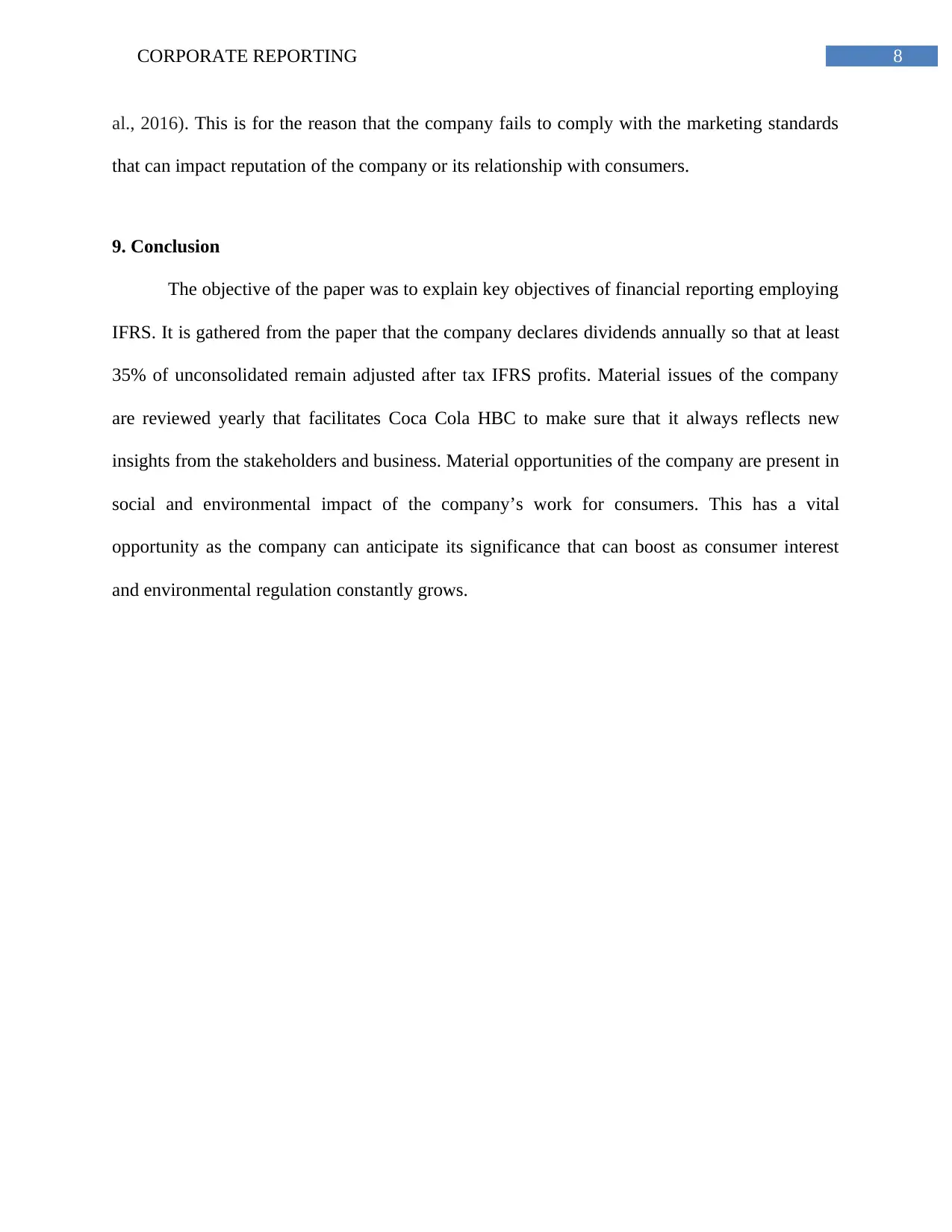
8CORPORATE REPORTING
al., 2016). This is for the reason that the company fails to comply with the marketing standards
that can impact reputation of the company or its relationship with consumers.
9. Conclusion
The objective of the paper was to explain key objectives of financial reporting employing
IFRS. It is gathered from the paper that the company declares dividends annually so that at least
35% of unconsolidated remain adjusted after tax IFRS profits. Material issues of the company
are reviewed yearly that facilitates Coca Cola HBC to make sure that it always reflects new
insights from the stakeholders and business. Material opportunities of the company are present in
social and environmental impact of the company’s work for consumers. This has a vital
opportunity as the company can anticipate its significance that can boost as consumer interest
and environmental regulation constantly grows.
al., 2016). This is for the reason that the company fails to comply with the marketing standards
that can impact reputation of the company or its relationship with consumers.
9. Conclusion
The objective of the paper was to explain key objectives of financial reporting employing
IFRS. It is gathered from the paper that the company declares dividends annually so that at least
35% of unconsolidated remain adjusted after tax IFRS profits. Material issues of the company
are reviewed yearly that facilitates Coca Cola HBC to make sure that it always reflects new
insights from the stakeholders and business. Material opportunities of the company are present in
social and environmental impact of the company’s work for consumers. This has a vital
opportunity as the company can anticipate its significance that can boost as consumer interest
and environmental regulation constantly grows.
⊘ This is a preview!⊘
Do you want full access?
Subscribe today to unlock all pages.

Trusted by 1+ million students worldwide
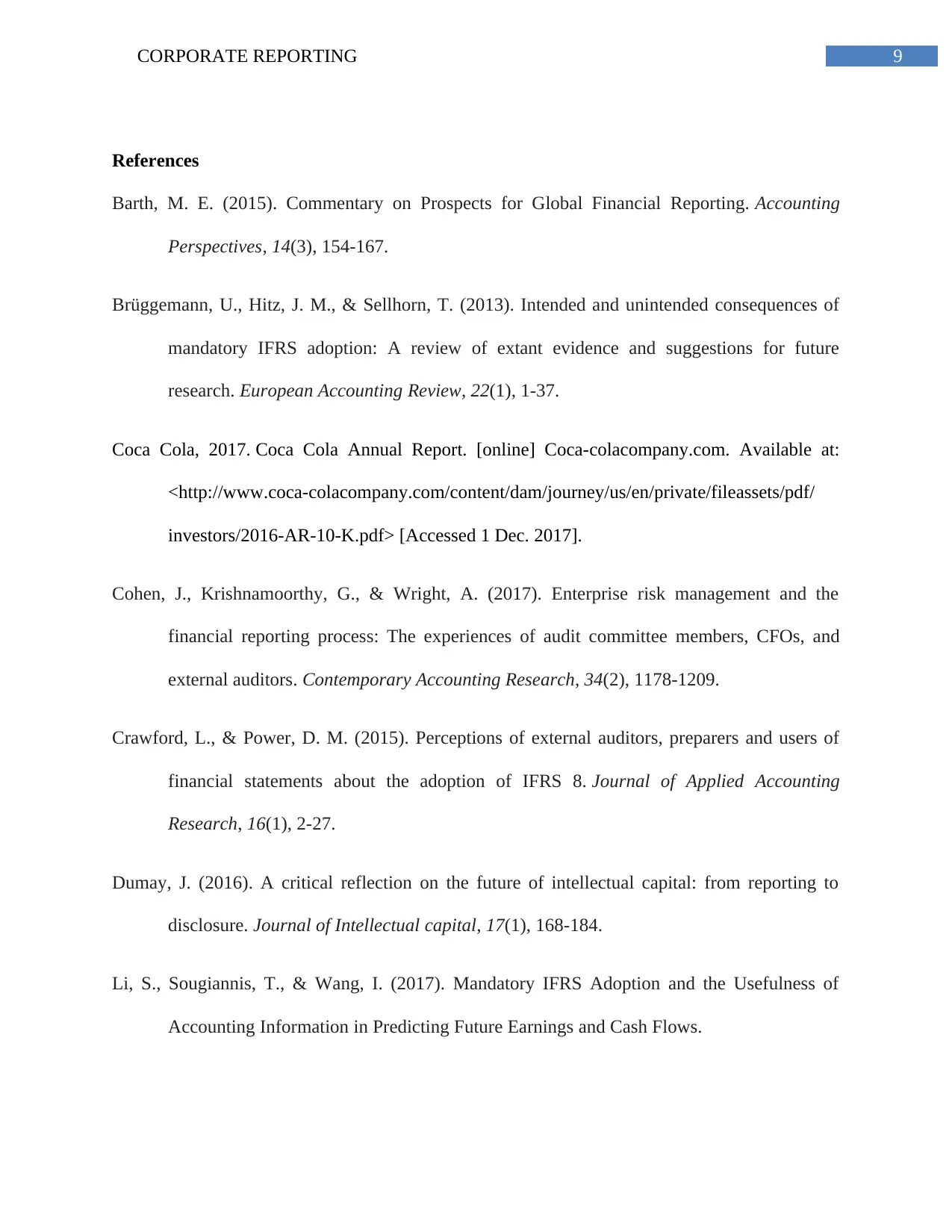
9CORPORATE REPORTING
References
Barth, M. E. (2015). Commentary on Prospects for Global Financial Reporting. Accounting
Perspectives, 14(3), 154-167.
Brüggemann, U., Hitz, J. M., & Sellhorn, T. (2013). Intended and unintended consequences of
mandatory IFRS adoption: A review of extant evidence and suggestions for future
research. European Accounting Review, 22(1), 1-37.
Coca Cola, 2017. Coca Cola Annual Report. [online] Coca-colacompany.com. Available at:
<http://www.coca-colacompany.com/content/dam/journey/us/en/private/fileassets/pdf/
investors/2016-AR-10-K.pdf> [Accessed 1 Dec. 2017].
Cohen, J., Krishnamoorthy, G., & Wright, A. (2017). Enterprise risk management and the
financial reporting process: The experiences of audit committee members, CFOs, and
external auditors. Contemporary Accounting Research, 34(2), 1178-1209.
Crawford, L., & Power, D. M. (2015). Perceptions of external auditors, preparers and users of
financial statements about the adoption of IFRS 8. Journal of Applied Accounting
Research, 16(1), 2-27.
Dumay, J. (2016). A critical reflection on the future of intellectual capital: from reporting to
disclosure. Journal of Intellectual capital, 17(1), 168-184.
Li, S., Sougiannis, T., & Wang, I. (2017). Mandatory IFRS Adoption and the Usefulness of
Accounting Information in Predicting Future Earnings and Cash Flows.
References
Barth, M. E. (2015). Commentary on Prospects for Global Financial Reporting. Accounting
Perspectives, 14(3), 154-167.
Brüggemann, U., Hitz, J. M., & Sellhorn, T. (2013). Intended and unintended consequences of
mandatory IFRS adoption: A review of extant evidence and suggestions for future
research. European Accounting Review, 22(1), 1-37.
Coca Cola, 2017. Coca Cola Annual Report. [online] Coca-colacompany.com. Available at:
<http://www.coca-colacompany.com/content/dam/journey/us/en/private/fileassets/pdf/
investors/2016-AR-10-K.pdf> [Accessed 1 Dec. 2017].
Cohen, J., Krishnamoorthy, G., & Wright, A. (2017). Enterprise risk management and the
financial reporting process: The experiences of audit committee members, CFOs, and
external auditors. Contemporary Accounting Research, 34(2), 1178-1209.
Crawford, L., & Power, D. M. (2015). Perceptions of external auditors, preparers and users of
financial statements about the adoption of IFRS 8. Journal of Applied Accounting
Research, 16(1), 2-27.
Dumay, J. (2016). A critical reflection on the future of intellectual capital: from reporting to
disclosure. Journal of Intellectual capital, 17(1), 168-184.
Li, S., Sougiannis, T., & Wang, I. (2017). Mandatory IFRS Adoption and the Usefulness of
Accounting Information in Predicting Future Earnings and Cash Flows.
Paraphrase This Document
Need a fresh take? Get an instant paraphrase of this document with our AI Paraphraser
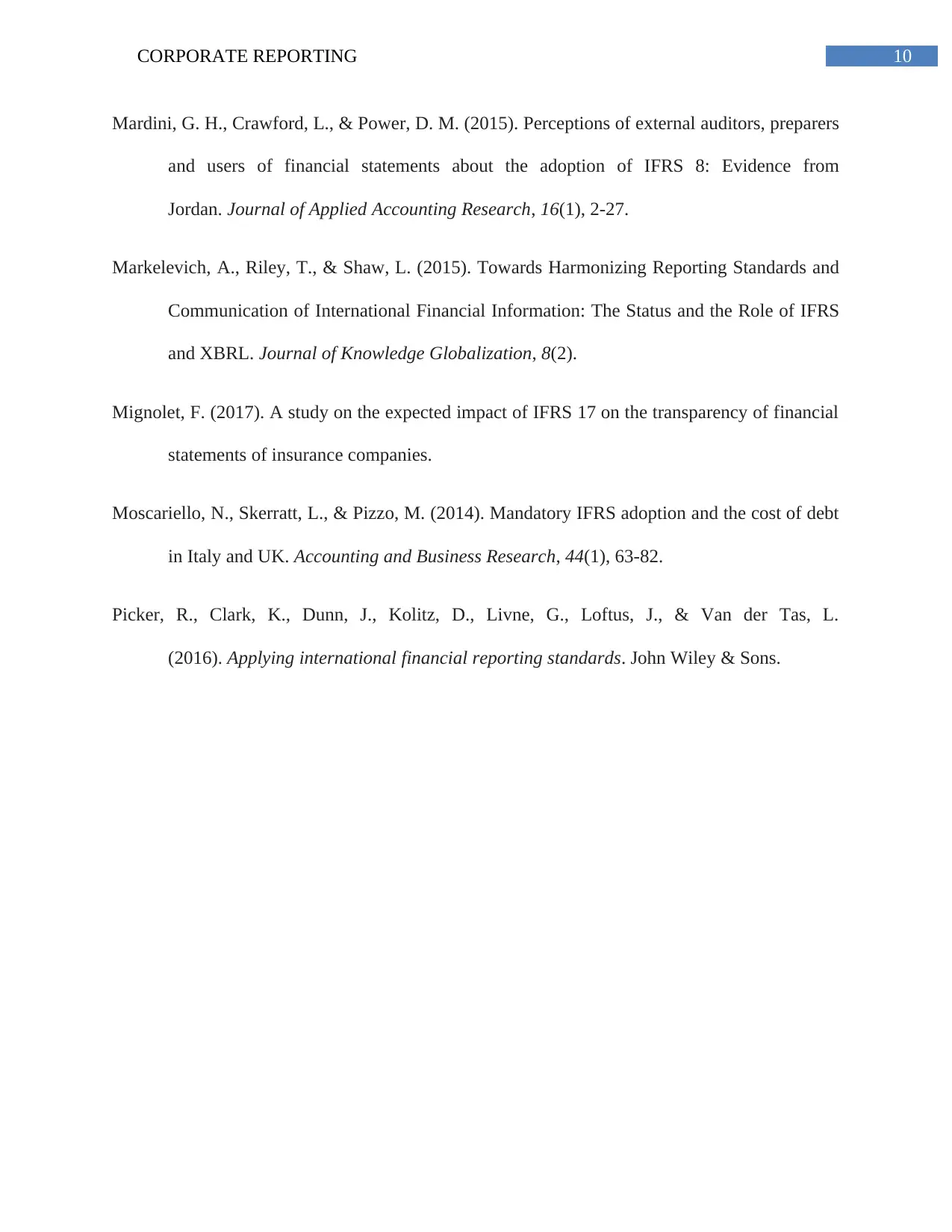
10CORPORATE REPORTING
Mardini, G. H., Crawford, L., & Power, D. M. (2015). Perceptions of external auditors, preparers
and users of financial statements about the adoption of IFRS 8: Evidence from
Jordan. Journal of Applied Accounting Research, 16(1), 2-27.
Markelevich, A., Riley, T., & Shaw, L. (2015). Towards Harmonizing Reporting Standards and
Communication of International Financial Information: The Status and the Role of IFRS
and XBRL. Journal of Knowledge Globalization, 8(2).
Mignolet, F. (2017). A study on the expected impact of IFRS 17 on the transparency of financial
statements of insurance companies.
Moscariello, N., Skerratt, L., & Pizzo, M. (2014). Mandatory IFRS adoption and the cost of debt
in Italy and UK. Accounting and Business Research, 44(1), 63-82.
Picker, R., Clark, K., Dunn, J., Kolitz, D., Livne, G., Loftus, J., & Van der Tas, L.
(2016). Applying international financial reporting standards. John Wiley & Sons.
Mardini, G. H., Crawford, L., & Power, D. M. (2015). Perceptions of external auditors, preparers
and users of financial statements about the adoption of IFRS 8: Evidence from
Jordan. Journal of Applied Accounting Research, 16(1), 2-27.
Markelevich, A., Riley, T., & Shaw, L. (2015). Towards Harmonizing Reporting Standards and
Communication of International Financial Information: The Status and the Role of IFRS
and XBRL. Journal of Knowledge Globalization, 8(2).
Mignolet, F. (2017). A study on the expected impact of IFRS 17 on the transparency of financial
statements of insurance companies.
Moscariello, N., Skerratt, L., & Pizzo, M. (2014). Mandatory IFRS adoption and the cost of debt
in Italy and UK. Accounting and Business Research, 44(1), 63-82.
Picker, R., Clark, K., Dunn, J., Kolitz, D., Livne, G., Loftus, J., & Van der Tas, L.
(2016). Applying international financial reporting standards. John Wiley & Sons.
1 out of 11
Related Documents
Your All-in-One AI-Powered Toolkit for Academic Success.
+13062052269
info@desklib.com
Available 24*7 on WhatsApp / Email
![[object Object]](/_next/static/media/star-bottom.7253800d.svg)
Unlock your academic potential
Copyright © 2020–2026 A2Z Services. All Rights Reserved. Developed and managed by ZUCOL.





